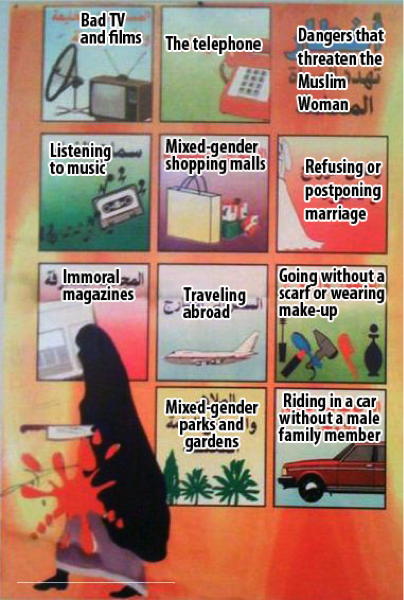
BY ANNA RUSSO:
On November 3, Saudi officials arrested a Kuwaiti woman as she was driving her diabetic father to the hospital. Her crime? Being in the driver’s seat.
Saudi Arabia is the only country in the world that essentially forbids women from holding a driver’s license. Women’s inability to drive is due largely to the “guardianship” laws that characterize Saudi society: women are not permitted to act in any way without the permission of a male guardian, whether a father, brother, or husband. A woman must ask permission to marry, to travel, to work, or to go to school. The de facto ban on Saudi driving is supported by the government: it does not issue any licenses to women drivers and women can be fired from their jobs or detained for being behind the wheel.
Saudi women are taught from birth that the only way to live safely is to follow the harsh restrictions on their rights this society imposes. An “education poster” from the 1980s was found posted at a school in Buraydah, a town in central Saudi Arabia, depicting a woman being stabbed by a kitchen knife for benign activities such as going to a mixed gender park or listening to music. Posters, although less extreme, are still being produced today to instill a fear in Saudi women of anything other than complete obedience to guardianship laws.

But Saudi activists are working to improve the rights of women despite these fears. On October 26, sixty Saudi women got into their cars and drove in a major act of protest against Saudi Arabia’s ultraconservative policies. They employed social media to publicize their dissent, tweeting and posting videos of driving cars.
The scale of this dissent is small: a handful of women, all driving with legally obtained licenses from abroad, made commonplace trips in the car. One woman’s large act of defiance was a fifteen minute round trip to the grocery store to buy a gallon of milk for her children. However, the significance of this event cannot be trivialized. Driving is both an essential right and a vessel to show all of Saudi society the capabilities of women. The inability of women to travel without the express consent and accompaniment of a male guardian truly confines a woman to the home and shuts her off from any association with the outside world. The ability to drive and travel gives women a mobility and freedom, which can act as a springboard to propel further realization of rights.

Driving is also a very public act; advancements in driving rights can be an ongoing demonstration of female capability and equality. A Saudi writer Maha al-Aqeel explains in an interview with The Guardian, “Driving is such a visible and symbolic thing. It’s not like women on the shura council – you cannot see that and you cannot see advances for women in the workplace. Many conservatives feel that if women get the right to drive then that’s it, the last bastion of male control will fall. I think it should lead to other changes. That’s why those who oppose it are so vehement. And that’s why the government is treading so carefully. It does not want to cause a big uproar.”
This Saudi protest is receiving worldwide press, with help from a viral Youtube video created and produced by Saudi comedian Hisham Fageeh. The video, entitled ‘No Woman, No Drive’ uses the Bob Marley song to satirize the conservative arguments against women’s driving such as religious leader Sheik Mohammed al-Nujaimi opinions calling the movement for women drivers a “great danger,” in an interview with the NY Times, claiming that it would ruin marriages, decrease birthrate, adultery, more car accidents and “the spending of excessive amounts on beauty products.” Fageeh’s video has received more than ten million views since its post two weeks ago.
It is easy to satirize the reasoning behind the ban of women drivers as excessively backwards and laugh at Fageeh’s jokes, but if we do so we risk being ignorant of the true struggles that women face in ultraconservative Saudi Arabia. They had no Arab Spring. Women are still not full citizens. And yet, even the most adamant activists, such as Madiha al-Ajroush, a psychologist who has been fighting for women’s right to drive since 1990 says, “This is not a revolution, and it will not be turned into a revolution.” Conservative ideals are entrenched in Saudi society, and no one, not even the most compromised citizens, is jumping to change that. Will a culture of woman drivers bring about enough freedom to spark that change?
Anna Russo ’17 is in Berkeley College. Anna writes about women’s issues around the world, focusing on health and education. Contact her at anna.russo@yale.edu.